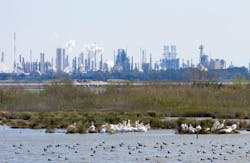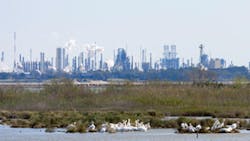Business is looking good for the chemical industry in Houston, Texas. Significant shale gas production growth has led to a boom in chemical production as well, which in turn has resulted in the creation of jobs and a boost in construction in the area.
Broadly speaking, the shale gas revolution has revitalized the chemical industry in Texas and other regions in the United States but the full impact of the rising chemical investment has been assessed by the American Chemistry Council (ACC) in a new study that highlighted the importance of Houston for the American chemical industry.
According to the ACC research, which analyzed 97 chemical facility projects either announced or underway at present, more than three-quarters of the projects are located in the U.S. Gulf Coast. Such a dense concentration of projects in the area has a profound effect on the economy of the state and Houston in particular, the Houston Business Journal reported.
In its report, called Shale Gas, Competitiveness and New U.S. Chemical Industry Investment: An Analysis Based on Announced Projects, the ACC estimated that the total investments for the 97 projects that were part of the study would come in at $71.7 billion by 2020, with a significant proportion coming from overseas companies.
In terms of job opportunities, the construction and the launch of these plants would add an extra 442,000 positions in local communities, both directly and indirectly. Meanwhile, the ACC calculated that the investments would generate $20 billion in federal, state and local tax payments, the news source said.
The fact that investors are choosing Houston and the area as a destination for their money is hardly surprising. The city has been a national hub for the chemical industry for years and this is unlikely to change in the foreseeable future, experts believe. Industry operations in the area have been facilitated by the presence of convenient infrastructure, pipelines and exporting terminals, where oil and gas derivatives and other chemical production can easily be distributed and shipped to other locations.
With the capacity expansion over the past few years, driven by the major development of shale gas production through horizontal fracking, production of natural gas liquids has reached unprecedented levels. Previously, such products were shipped into Houston's chemical plants but this is no longer necessary, as the state can now rely on its own natural gas liquid feedstock for chemical production.
According to ACC estimates, by 2020, when the vast majority of the new projects will be completed and in action, chemical industry output will have increased by a total value of $66.8 billion. This increase will result in 46,000 direct chemical industry jobs, 264,000 indirect jobs and 310,000 induced jobs that are predicted to remain stable in the long term, the report noted. This leaves the industry with the problem of finding the necessary workers, as recently the Houston Business Journal reported that thousands of industry workers were moving to more profitable energy projects.

